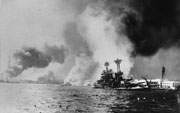-
(单词翻译:双击或拖选)
70th Anniversary of Pearl Harbor Approaches
On Dec. 7, 1941, the Imperial Japanese Navy staged a surprise attack on the U.S. naval1 base at Pearl Harbor. Five U.S. battleships sank or were severely2 damaged, several hundred warplanes were destroyed and more than 2,400 people died.
In an historic speech, President Franklin D. Roosevelt called it "a date which will live in infamy3."
As the United States prepares to mark the 70th anniversary of Pearl Harbor, two new books revisit the the most devastating4 foreign attack on U.S. soil until the Sept. 11 terror attacks in 2001.
Days that changed America
Historian Craig Shirley was born more than a decade after the end of World War II, but the war was ever-present during his childhood.
“I grew up in a family, a culture, where the point of reference for everybody in conversation was, before the war, during the war, and after the war." Shirley recalls. "Everybody in my family had been involved directly in the war, whether civilian5 or military.”
 |
| The USS California, right, after being struck by a torpedo6 and a bomb during the Japanese attack on Pearl Harbor on Dec. 7, 1941. |
President Roosevelt had resisted joining the war in Europe. He had been re-elected to a third term. The nation was gradually climbing out of the Great Depression.
“Franklin Roosevelt made public speeches saying to American mothers, ‘I’m not going to send your boys to fight a European war,'" Shirley says.
But all that changed when Japan attacked Pearl Harbor. In his book, "December 1941: 31 Days That Changed America and Saved the World," Shirley dedicates each chapter to a day, starting on Dec. 1.
On Dec. 8, President Roosevelt addressed a joint7 session of Congress with his famous speech.
“Everything stopped at about one o’clock in the afternoon," Shirley says. "Everybody gathered around their radios, in their homes, in their libraries, in their churches. There were radio repair stores all over America that had radios out in front of their stores. They would have them on for passersby8 to listen to. The stock market stopped. Everybody stopped to listen to the president of the U.S.”
Forty minutes later, Congress declared war against Japan. On Dec. 11, Germany declared war on the U.S. and America joined the battle.
Going to war, Shirley says, changed America.
“Women built airplanes, tanks and learned how to become firefighters," he says. The nation’s capital changed overnight.
“Tens of thousands of civilians9 and military personnel come into the city," Shirley explains. "New buildings sprang up every place. All the federal buildings have machine guns on top of them. There are navy and marine10 armed guards stationed at the entrance to every federal building in Washington, the Capitol, the White House, the State Department.”
America as a global power
While Shirley focuses mostly on what happened in the United States, another book, “December 1941: Twelve Days that Began a World War," offers an international perspective.
“The 12 days are really pivotal in terms of the war as a whole and in the 20th century as well," says author Evan Mawdsley, a history professor at the University of Glasgow. “In fact, the Japanese attacked the British before they attacked Pearl Harbor by about half an hour, when they attacked Malaya. The reason why they attacked Pearl Harbor is because they wanted to make sure that the American navy couldn’t intervene in their invasion of Malaya.”
According to Mawdsley, the world after Dec. 7 became fundamentally different from the world just one day before.
“America as a global power, the real beginning of that, I think, does date back to the shock of Pearl Harbor," he explains. "Up till that time, the whole fate of the world was determined11 by the European powers. And from the first days of December, all of a sudden, the way it operates has become global. You could argue, I think, that the globalization almost dates back to this period of time.”
 收听单词发音
收听单词发音
1
naval

|
|
| adj.海军的,军舰的,船的 | |
参考例句: |
|
|
|
2
severely

|
|
| adv.严格地;严厉地;非常恶劣地 | |
参考例句: |
|
|
|
3
infamy

|
|
| n.声名狼藉,出丑,恶行 | |
参考例句: |
|
|
|
4
devastating

|
|
| adj.毁灭性的,令人震惊的,强有力的 | |
参考例句: |
|
|
|
5
civilian

|
|
| adj.平民的,民用的,民众的 | |
参考例句: |
|
|
|
6
torpedo

|
|
| n.水雷,地雷;v.用鱼雷破坏 | |
参考例句: |
|
|
|
7
joint

|
|
| adj.联合的,共同的;n.关节,接合处;v.连接,贴合 | |
参考例句: |
|
|
|
8
passersby

|
|
| n. 过路人(行人,经过者) | |
参考例句: |
|
|
|
9
civilians

|
|
| 平民,百姓( civilian的名词复数 ); 老百姓 | |
参考例句: |
|
|
|
10
marine

|
|
| adj.海的;海生的;航海的;海事的;n.水兵 | |
参考例句: |
|
|
|
11
determined

|
|
| adj.坚定的;有决心的 | |
参考例句: |
|
|
|















